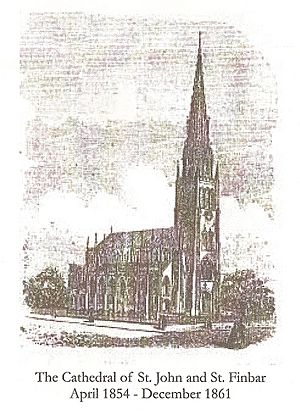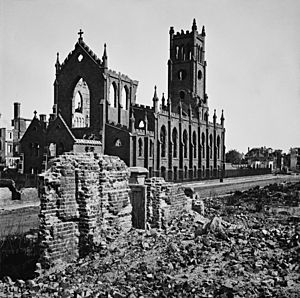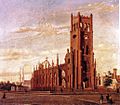Cathedral of Saint John and Saint Finbar facts for kids
Quick facts for kids Cathedral of Saint John and Saint Finbar |
|
|---|---|

The Cathedral
|
|
| Religion | |
| Affiliation | Roman Catholic |
| District | Diocese of Charleston |
| Ecclesiastical or organizational status | Cathedral |
| Location | |
| Location | Charleston, South Carolina, United States |
| Architecture | |
| Architect(s) | Patrick C. Keely |
| Architectural style | Gothic Revival |
| Completed | 1854 |
| Construction cost | $103,000 |
| Specifications | |
| Direction of façade | South |
| Capacity | 1,200 |
| Length | 156 ft (48 m) |
| Width | 72 ft (22 m) |
| Width (nave) | 72 ft (22 m) |
| Height (max) | 216 ft (66 m) |
| Spire(s) | 1 |
| Spire height | 216 ft (66 m) |
The Cathedral of St. John and St. Finbar was the very first Roman Catholic cathedral built in Charleston, South Carolina. It was built after the first Roman Catholic Church in Charleston, called St. Mary's, which started around 1800.
Building the Cathedral of St. John and St. Finbar began in 1850. It was officially opened on April 6, 1854. Sadly, a big fire destroyed the cathedral on December 11, 1861. This fire also damaged a large part of Charleston. A new cathedral, called the Cathedral of Saint John the Baptist, was later built on the same spot. Its construction started in 1890, and it opened in 1907. The new cathedral was finally finished in 2010 when its tall steeple was added.
History of the Cathedral
The idea for the Cathedral came from the first Bishop of the Roman Catholic Diocese of Charleston, Bishop John England. He was from County Cork, Ireland. In 1821, he bought a piece of land in Charleston. There was a house on the land, and on December 30, 1821, Bishop England blessed it. He made it a temporary chapel and named it after St. Finbar, who was the patron saint of Cork.
Bishop England then started planning and raising money for a main church for the area. However, he passed away before the Cathedral was built. Right Reverend Ignatius Reynolds became the next Bishop in 1844. He was in charge of finishing the construction.
The Cathedral was designed by Patrick Charles Keely, who was from County Tipperary, Ireland. He designed it in a fancy Gothic style. The building was planned to be 219 feet tall, with a steeple and a bronze cross on top. Like the later Cathedral of Saint John the Baptist, the Cathedral of St. John and St. Finbar was built using brownstone from Connecticut.
People thought the brownstone building was safe from fire. So, when the Great Fire of 1861 happened, church members and neighbors put their valuable things inside the Cathedral. They hoped their items would be safe, but unfortunately, they were not.
Just one week before the fire destroyed the Cathedral in 1861, its insurance policy had expired. Because there was no insurance and because of the problems during the Civil War in Charleston, the Cathedral's ruins stayed there for many years. The remains of the building stood until a big 1886 Charleston earthquake in 1886 caused the rest of the tower to fall down.
The fire that destroyed the Cathedral also ruined many other important church buildings. It destroyed the church school, the first free Catholic school for girls, a huge library with 17,000 books, the offices of the first Catholic newspaper in the US (called The Catholic Miscellany), and many church papers. Because everything was destroyed, the church community didn't have a place to meet for 29 years. Then, a new brownstone Gothic style Cathedral of Saint John the Baptist was built on the same Broad Street location, also designed by Keely.
The first Cathedral was named after the famous St. John the Baptist and the less famous St. Finbar. Bishop John England likely chose to honor St. Finbar in the Cathedral's name. St. Finbar was the person who founded the abbey that later became the City of Cork, Ireland. Bishop John England became a bishop in Cork Cathedral before he came to Charleston in 1821. So, he knew a lot about the Irish Saint Finbar. It is not fully known why St. John the Baptist was also honored in the naming, other than being a popular name for Catholic buildings throughout history.
The Gibbes Museum of Art and the Carolina Art Association have a famous 1868 painting of the ruins of the Cathedral of Saint John and Saint Finbar by William Aiken Walker. You can also see a picture of how the Cathedral looked from April 1854 to December 1861 on Wikipedia.
See also
 In Spanish: Catedral de San Juan y San Finbar para niños
In Spanish: Catedral de San Juan y San Finbar para niños
 | Claudette Colvin |
 | Myrlie Evers-Williams |
 | Alberta Odell Jones |



